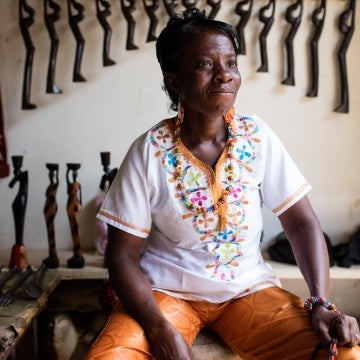Low-income women are more vulnerable to climate risks and face more barriers than men in accessing the resources and tools needed to manage these risks. According to the UN, climate change could push 158 million more women and girls into poverty by 2030 due to their limited access to adaptive resources. Climate adaptation support seldom benefits vulnerable women, yet when equipped with the right financial tools and services, women can be powerful agents of change, driving climate resilience within their households, businesses, and communities.
Inclusive finance offers a powerful channel to support women’s climate adaptation. Women’s financial inclusion (WFI) programs have been shown to empower low-income women to build resilience and pursue business opportunities. In a climate context, they can be tailored to support women’s climate adaptation through a combination of financial and non-financial services – as demonstrated in a series of case studies highlighting climate-smart innovations in Nicaragua, Kenya, and India by Mennonite Economic Development Associates, Village Enterprise, and SEWA.
Project managers of international development agencies have an opportunity to meaningfully support women’s climate adaptation and resilience by designing projects that combine inclusive finance, gender, and climate adaptation activities and expertise. One approach is to strengthen financial services providers (FSPs) to drive climate-smart WFI themselves. However, according to our research, FSPs find funders’ support insufficiently tailored to their needs in this area.
FSPs wish for more holistic and long-term support that equips them with the capabilities, resources, incentives, and relationships to serve vulnerable women with climate-smart products and services. More specifically, FSPs face four major barriers in realizing the opportunities of climate-smart WFI, which funders are well placed to help them overcome.
1. Facilitate access and use of data on women’s climate risks and adaptation needs
One commonly cited barrier is a lack of data on women’s risk exposure, adaptation needs, and adaptation actions. This is compounded by the general lack of data on women’s financial service usage history, repayment performance, and business activities. As a result, women are often perceived as risky clients, and the business opportunity in serving women is underappreciated. Without sufficient data, FSPs also lack the insights needed to design customized products for women.
Project managers can address this barrier by financing gender-disaggregated data collection and research, and by providing technical assistance to build FSPs’ capacity to analyze and use such insights in their operations.
For example, the Affirmative Finance Action for Women in Africa (AFAWA) Program, led by the African Development Bank, aims to bridge the $49-billion gender finance gap and unlock women’s entrepreneurial capacity in Africa. It combines access to finance, technical assistance, and enabling environment-related activities. Under the technical assistance pillar, AFAWA helps FSPs implement gender-disaggregated data collection and reporting systems, enabling them to track financial indicators and assess the performance of women-led businesses within their portfolio. This data-driven approach ensures that financial products align with the needs of women entrepreneurs.
2. Support climate-responsive product design and implementation
FSPs need resources and capabilities to develop products that respond to women’s climate adaptation and resilience needs. Product development relies on both robust data (as mentioned above) and the ability to translate insights into action. Additionally, partnerships are crucial: for example, partnerships between credit and insurance providers, or collaborations with organizations offering climate-smart solutions such as information and training, agricultural inputs, or construction materials that support adaptation and resilience building.
Project managers can offer FSPs financial and technical resources to design, pilot, and implement women-centric products, as well as help in identifying and forming relevant partnerships. To achieve systemic change and encourage replication of products and partnerships that meaningfully contribute to women-led climate action, funders can also support impact monitoring and the documentation and sharing of success stories.
For example, Arsht-Rock provided a grant to support Blue Marble and the Self-Employed Women’s Association (SEWA) for developing and launching an innovative heat index insurance for vulnerable women in India. Policyholders are paid approximately US$3.50 per day when the daily maximum temperature exceeds a predetermined factor for two or more consecutive days. The product has since been scaled to reach more SEWA members and combined with other financial services to further strengthen climate resilience and adaptation among low-income women.
3. Help reduce the costs of serving vulnerable women
Serving women often comes with higher costs. Women may face restrictions on mobility, require more face-to-face interaction due to lower literacy levels, or have less confidence in using digital tools. Addressing these challenges requires a deeper understanding of the underlying gendered social norms and innovative solutions to overcome or transform them. FSPs often lack the capacity and incentives to undertake such analysis and implement gender-sensitive or transformative measures.
Project managers may provide technical assistance and bring in gender experts to uncover the root causes of gender-specific barriers and design actions to address them. In addition, FSPs will need concessional funding, loan guarantees, and impact incentives to offset the higher cost of serving women and reward FSPs that deliver climate-smart financial solutions to women.
For example, Aceli Africa channels donor funds to reward FSPs for lending to women-led businesses, especially for their adoption of climate-smart practices. These origination benefits help FSPs compensate for the lower revenues and higher operating costs of these loans.
4. Strengthen the enabling environment and foster demand for climate adaptation solutions
Building capable and motivated FSPs is not enough. The ecosystem in which they operate must also be strengthened to support climate-smart WFI. This includes addressing barriers related to policies, regulations, social norms, and the financial sector’s support infrastructure, such as (climate) data systems, capacity building initiatives, public-private dialogue platforms, and distribution networks. Customers, too, need to be aware of and interested in using financial and non-financial products that support their climate adaptation.
To achieve systemic change, project managers should conduct diagnostics to identify barriers across all actors in the financial system and collaborate with local and other international actors to address these. Markets may also benefit from policy advocacy and facilitation of dialogue among public, private, and international development actors.
For example, Financial Sector Deepening Trust in Tanzania partnered with CGAP to assess current activities in Tanzania’s financial system that support FSPs in managing and responding to growing climate risks. The diagnostic highlighted key gaps and priority actions for government and development funders to strengthen inclusive adaptation finance, particularly for women.
As illustrated in these examples, a single intervention alone cannot generate the systemic changes needed to enable climate-smart WFI. Doing so requires a combination of interventions and collective action among financial inclusion, gender, and climate sector stakeholders. Project managers have a clear opportunity for achieving meaningful impact: by combining interventions that address the barriers FSPs face and strengthening the broader ecosystem, their projects can enable women to adapt to climate risks and build resilient futures. CGAP’s recent report provides detailed guidance for project managers who seek to support climate adaptation and resilience through inclusive, climate-resilient, and climate-responsive financial systems.



